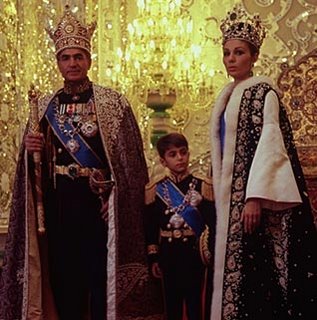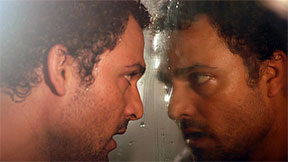T

There were two stories out today that really caught my eye, and showed that if we just live up to our principles the 'war' on terror really is winnable. And we won't even have to nuke anyone in the process.
First, an Associated Press story, Moussaoui Has New View of Justice System
Michael J. Sniffen: Stunned that he was sentenced to life in prison rather than execution, Zacarias Moussaoui now believes he could get a fair trial from an American jury. Too late, the judge says.
U.S. District Judge Leonie Brinkema quickly rejected a motion the confessed al-Qaida conspirator filed Monday to withdraw his guilty plea and get a new trial.
In his motion, Moussaoui said he lied on the witness stand March 27 when he reversed four years of denials and claimed he was to have hijacked a fifth jetliner on Sept. 11, 2001, and crashed it into the White House, "even though I knew that was a complete fabrication."
The 37-year-old Frenchman blamed his behavior on the effects of solitary confinement, his inability to get a Muslim lawyer and his misunderstanding of the U.S. justice system.
Moussaoui said he was "extremely surprised" by his life sentence by a federal court jury last week.
"I had thought I would be sentenced to death based on the emotions and anger toward me for the deaths on Sept. 11," he explained in an affidavit. "But after reviewing the jury verdict and reading how the jurors set aside their emotions and disgust for me and focused on the law and the evidence ... I now see that it is possible that I can receive a fair trial even with Americans as jurors."
Why aren't we celebrating this?! Shouldn't we be dropping leaflets with Moussaoui's motion all over the Middle East?
As I heard on a panel a couple of weeks ago, we've won when our enemies turn to our systems to confront us, instead of bloodshed.
Moussaoui's words are instantly believable, to my ears--I never thought he was some 9/11 mastermind, despite his crazy courtroom rhetoric. As Humphrey Bogart says in the Maltese Falcon, the cheaper the crook the gaudier the patter. He was just using the trial as a forum for his views, thinking he was a dead man anyway and he may as well make the most of it. From his point of view, he had no reason to believe our justice system wasn't inherently corrupt and racist. And then one day--wow, not dead after all.
How great a story is this... Islamic militant exposed to America, concludes that he was wrong. All he's said so far is he was surprised to get a fair trial, there's no indication he still doesn't want to kill Americans. But at least it's a first step; and lying awake in his jail cell at night, he's got to be puzzling out why our justice system is fair, and whether he's wrong about the bigger picture as well.
Heck, maybe it's a new trend;
Iranian President's Letter to Bush Emerges Christine Hauser in the Times:
In his letter to President Bush, Iran's President, Mahmoud Ahmadinejad, declared that Western-style democracy had failed and that the use of secret prisons in Europe and aspects of the war in Iraq could not be reconciled with Mr. Bush's Christian values. But the letter did not address directly the central issue that divides the two countries: Iran's nuclear ambitions.
In his wide-ranging letter, written in Persian with an English translation, Mr. Ahmadinejad at times challenges and concedes as he directs question after question to Mr. Bush but offers no concrete proposals. In Iran today, the Iranian president portrayed it as a blueprint of "suggestions for resolving the many problems facing humanity," the Iranian news agency IRNA reported.
State Department officials who read the letter suggested that it offered an interesting window into the mentality and thinking of Iran, especially because it seemed to reflect a inclination to dwell on myriad grievances of the past rather than on the problem at hand, namely Iran's suspected nuclear weapons program. ...
The letter has been described as the first direct communication from an Iranian leader to an American president since 1979.
While Mr. Ahmadinejad said today in Iran that "Islamic courtesy" prevented him from revealing the contents of the letter and American government officials have not released a copy, an English translation provided by the Iranian government was released by United Nations diplomats.
As for the actual contents of the letter, some interesting excerpts via the Times:
Mr. Ahmadinejad also calls the 9/11 attacks a "horrendous incident" in which the killing of innocent people was "deplorable."
But he asks: "Why have the various aspects of the attacks been kept secret? Why are we not told who botched their responsibilities? And, why aren't those responsible and the guilty parties identified and put on trial?"
The letter provides at times a striking insight into the Iranian president's vision of double standards in American foreign policy, criticizing what he portrays as a lack of support for elected Palestinian and Latin American governments.
Mr. Ahmadinejad also portrays himself as having his finger on the pulse of the Middle East region.
"As you are well aware," Mr. Ahmadinejad says, directly addressing President Bush, "I live amongst the people and am in constant contact with them — many people from around the Middle East manage to contact me as well. They do not have faith in these dubious policies either."
"There is evidence that the people of the region are becoming increasingly angry with such policies." ...
In his letter, Mr. Ahmadinejad both concedes and needles. With his country having fought a war with Iraq under Saddam Hussein, Mr. Ahmadinejad at once applauds the overthrow of the regime while criticizing what he seems to imply as a double standard.
"Of course Saddam was a murderous dictator," he wrote. "But the war was not waged to topple him, the announced goal of the war was to find and destroy weapons of mass destruction."
He later adds: "I point out that throughout the many years of the ... war on Iran Saddam was supported by the West."
Its tone appears at times exceedingly polite, at least once referring to Mr. Bush as "Your Excellency," according to the translation. He also says it is not his intention to "distress anyone. "
But the Iranian president's style is to dissect what he sees as American logic, by posing question after question to make his point.
If billions of dollars spent on security, military campaigns and troop movement were instead spent on issues including health and aid to the poor, he wrote, "would there have been an ever increasing global hatred of the American governments?"
The Iranian president also extends to Mr. Bush an "invitation" to return to governing the United States based on the values of Jesus Christ, whose name in the letter is followed each time by the letters "PBUH," which stands for "Peace Be Upon Him."
Frequently quoting passages from the Koran, Mr. Ahmadinejad calls for a return to a religious basis of government.
"Will you not accept this invitation?" Mr. Ahmadinejad asks Mr. Bush. "That is, a genuine return to the teachings of prophets, to monotheism and justice, to preserve human dignity and obedience to the Almighty and His prophets?"
Polite and aimed at dissecting American logic... not exactly typical views of Iranian leaders. And it's striking how reminiscent the letter is of Bush's domestic critics, as well sentiments expressed by our European allies and millions more the world over.
I think the most interesting thing about the letter is that the Iranians apparently think in this day and age policies could still be decided on the basis of reasoned argument.
There's something touchingly naive about this; and it absolutely belies the administration's efforts to paint Iran as a one-track monster, hellbent on getting nukes so as to pull down the temple around it. Iran's trying to reason with the U.S., they're clearly not some barbaric country going off the deep end.
It's interesting, hashing things out logically and engaging your opponent in debate are supposed to be Western hallmarks, borne of the Enlightenment. Yet in this case, it's the Iranians who, however naively and with whatever ulterior motives, seem to be going down that path, and the U.S. that, once again, is hoping to drown out the discussion with war drums.
The letter seems to harken back to the days when our Founding Fathers locked themselves up in a Philadelphia room and argued, yelled, cursed, bargained and ultimately forged our Constitution. It seems unbelievably Pollyanaish in our day and age to imagine our president and Iran's getting together to work something out--the U.S. would never accept Iran as a negotiating partner, nor the equality such a situation would entail; besides which, it's been a long time since we needed to rely on the force of our arguments or convictions to carry the day. Not to mention President Bush is no one's idea of a champion.
We really ought to be ashamed of ourselves; Iran actually has the most vibrant democracy in the Middle East, after Israel--we could stand to learn from them in this case.
The Times, for some reason, runs two articles on the letter--I'm not sure if I've ever seen that, it may be a mistake. At any rate, the second article is by Michael Slackman, who also wrote the initial article yesterday. It's actually pretty much the same as Hauser's piece, with this lead:
With the tone of a teacher and the certainty of a believer, the president of Iran wrote to President Bush that Western democracy had failed and that the invasion of Iraq, American treatment of prisoners and support for Israel could not be reconciled with Christian values.
The entire text is
posted here by Le Monde. Oddly enough, despite running two articles the Times doesn't have their own version of the letter, just a link. Well, at least they provide that--and at least they've advanced beyond their moronic headline on the story yesterday,
Iranian Writes to Bush; No R.S.V.P. Is Likely .Could you imagine a headline reading 'Frenchman writes to Bush'?! Besides which, unlike an invitation, you don't RSVP to a letter, you just respond.
The sad thing is I don't think our current president will read the letter, let alone respond. Even though the letter is peppered with the same kind of 'the end of times is near' beliefs Bush and his evangelical ilk are guided by. Actually, people who don't know that Muslims consider Jesus a prophet just like Muhammed, just not the final one, may be surprised by some of the language, like in the second paragraph:
Can one be a follower of Jesus Christ (PBUH), the great Messenger of God,
Feel obliged to respect human rights, Present liberalism as a civilization model, Announce one's opposition to the proliferation of nuclear weapons and WMDs, Make War and Terror his slogan, And finally, Work towards the establishment of a unified international community – a community which Christ and the virtuous of the Earth will one day govern, But at the same time, Have countries attacked; The lives, reputations and possessions of people destroyed and on the slight chance of the … of a … criminals in a village city, or convoy for example the entire village, city or convey set ablaze.
At any rate, I doubt Bush is someone who will be drawn into a debate, over the Bible or foreign policy... he probably sees it all as intellectual sophistry, he prefers to just look into people's eyes. More proof that the man is absolutely the wrong leader for the times.
All we have to do is let them see us for what we are. Terrorists are still people; they have causes and beliefs, no matter how misguided and twisted. For all the Republican puffery about Reagan's military buildup winning the Cold War, it wasn't that. It was our superior economic, political and cultural system. In the end, Eastern Europe and the USSR wanted to be more like us than we wanted to be like them.
Likewise, Islamic militancy has no real appeal for well-adjusted, normal people. In their hearts, Muslims know the mullahs are crazy. But some of them feel like they have no choice, when America won't let them do normal things like become port workers it's not surprising that some will turn to the seductive and emotional arguments of the local Jerry Falwell. Mix in dire poverty and generations of national humiliation, and it's really a testament to the moderating power of the Koran that more Muslims haven't turned to violence.
It's our challenge to create the conditions for normality to breed around the world, rather than propping up repressive regimes and waging crazy wars--either verbally or literally--to beat people into submission.
Just be ourselves, to borrow from dating advice 101. In our case, we don't need the world to love us, just to respect us and ultimately emulate us.
It will never happen, nor should it take place, at the end of a gun. The pen truly is mightier than the sword--and ink by the barrelful costs less than bullets.
Uncredited AP photo of Zacarias Moussaoui from Carver County Sheriff's Department via the Washington Post AP Photo of Iranian President Mahmoud Ahmadinejad, left, waving as he is welcomed by Indonesia's Foreign Minister Hassan Wirajuda, right, on his arrival in Jakarta by Ed Wray.















